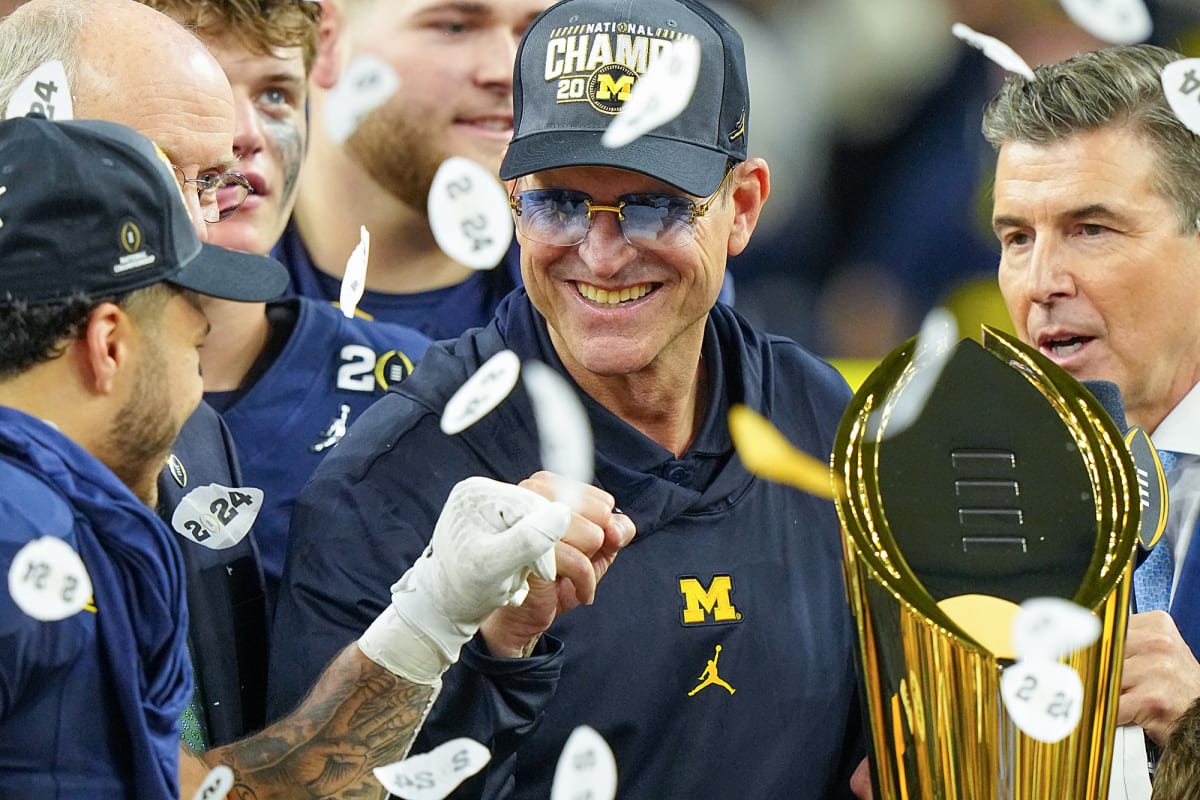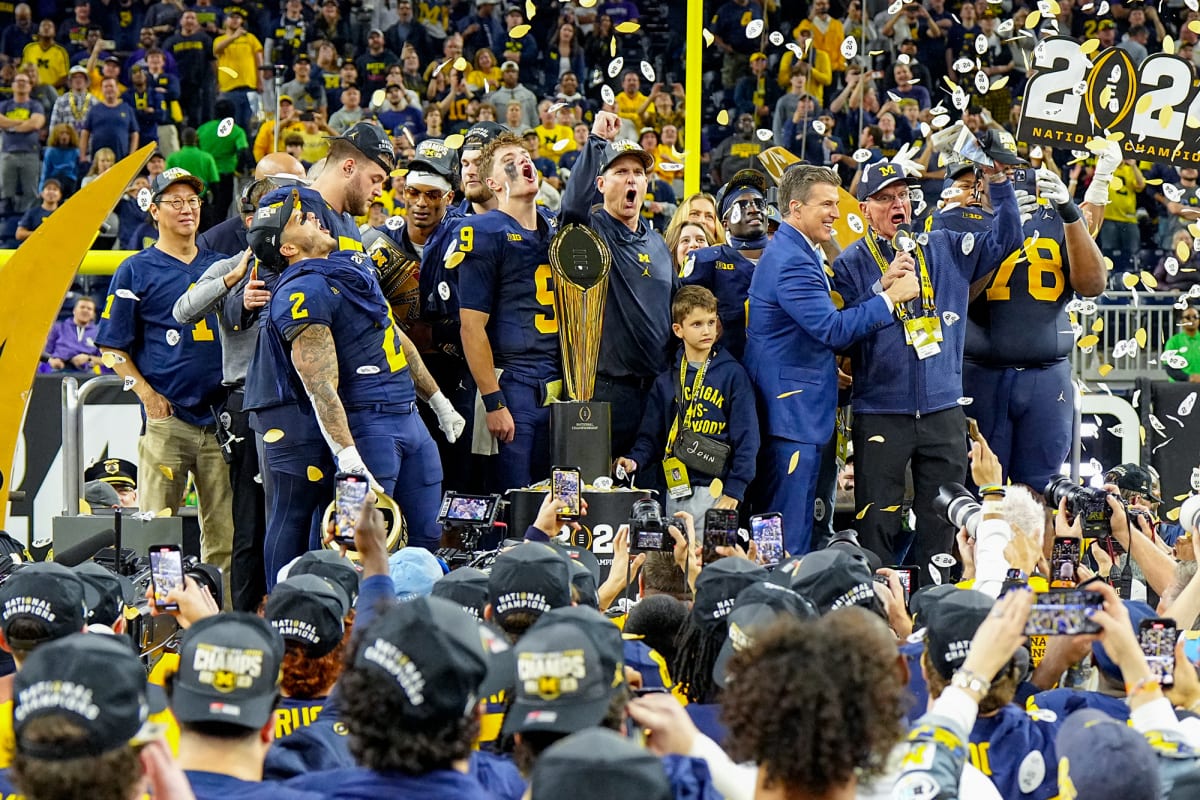In NFL circles, there is a sense that Jim Harbaugh is ready to return to the pros. He just led Michigan to a national championship. He has said he wants to win a Super Bowl. He talked to NFL teams in each of the last two winters. He recently hired Don Yee, an agent with extensive experience negotiating NFL contracts, and he still has not signed the extension Michigan offered him last month.
But people around Harbaugh and the Michigan program have a very different impression: He could leave, but he prefers to stay at Michigan.

Erick W. Rasco/Sports Illustrated
So why does he want to stay—and why hasn’t he signed the offer on the table?
Let’s start with the offer. Salary is not the biggest sticking point.
Michigan is currently involved in two NCAA investigations: One concerning COVID-19 dead-period recruiting violations, and the other into illegal sign-stealing. NCAA investigators believe Harbaugh misled them about the COVID-19 violations. Harbaugh is adamant that he did not. He is also adamant that he knew nothing about the illegal sign-stealing until it became public. Harbaugh has already been suspended three games for each, by Michigan and the Big Ten, respectively. The NCAA is likely to administer additional penalties next fall.
People familiar with the discussions say Harbaugh wants contractual assurance that, if the NCAA comes down hard on him based on information the school already has, Michigan cannot then fire him “for cause.”
Look at this from Harbaugh’s perspective. His contract is with Michigan, not with the NCAA. He clearly disagrees with the NCAA and Big Ten’s interpretations of certain events. An NFL team would offer Harbaugh a fully guaranteed contract. Why would he turn that down to stay at Michigan if he can get fired eight months from now, with no severance, because of an NCAA ruling?
Harbaugh has worked at Michigan for 10 years. Administrators know who he is by now. They have seen how players feel about him, their character off the field, the academic environment in the program, and how his teams play—and from all indications, they like what they see. Harbaugh should be subject to the same standards of conduct as any other department leader at the school.
Now, for why he would want to stay: Harbaugh is driven by a competitive force that is unusual even compared to other football coaches. When a challenge or problem gets into Harbaugh’s head, he will concentrate on it for as long as it takes to figure it out, no matter what he is scheduled to be doing. We tend to think of extremely competitive people as ruthless or emotionless—driven by winning and nothing else. But the competitive force inside Harbaugh is so intertwined with his personality that when it is triggered, it usurps almost every conventional desire, including the thirst for money—and even, as strange as this sounds, the desire to win football games.
It is easy, from the outside, to say, “Jim Harbaugh is hypercompetitive, he has already won a national title, so now he will want to win a Super Bowl.” But because the competitive force inside him is such a fundamental part of his existence and goes beyond football, it’s not that simple.
He is not just trying to check off boxes on a coach’s to-do list.
He is perpetually chasing the feeling he had Monday night.
Harbaugh’s affection for his current players and coaches runs deep. He knows if he stays at Michigan, he will be competing alongside people he loves, and he knows they have the kind of commitment and dedication he craves. He cannot say that as confidently about any NFL team.
But here is another byproduct of that competitive force: Because Harbaugh looks for competition everywhere, he can also see victory and defeat everywhere—and when there is no scoreboard, he needs to get that validation somehow. This makes Harbaugh more sensitive than the public realizes.
One of the strange things about Harbaugh is that, because he is so easily caricatured, people often imagine what he is thinking instead of paying attention to what he actually says.
In October, he said this: “You want to be somewhere where you’re wanted. They like what you do and how you do it, and they tell you that. Your bosses tell you that, and then that gets reflected in a contract.”
You want to be somewhere where you’re wanted. I cannot stress enough how important this is to Harbaugh. In 2011, he pulled out of the Michigan coaching search after the school’s athletic director at the time, Dave Brandon, cooled on him. He took the 49ers job instead. When that started to go sour, the 49ers tried to paint him as wanting power or more money, and Harbaugh responded publicly, telling me: “I have never said to anybody that I want to be the highest-paid coach in football. I make plenty of money. Plenty of money.”

Erick W. Rasco/Sports Illustrated
After the 2014 season, Harbaugh would have been the hottest candidate on the NFL coaching market. He chose to coach his alma mater instead. There were sentimental reasons, sure. But also: Michigan wanted him more than anybody else did.
Now, fast-forward to the COVID-19-shortened 2020 season. Michigan went 2–4. Harbaugh had not yet beaten Ohio State or won the Big Ten.
One evening in December, he stopped at his parents’ house in Ann Arbor, which is next to his own.
“I remember, it was about seven o’clock,” his father, Jack, told me last week. “He sat down on the couch with us. And he said, ‘I just want to get you ready: Tomorrow, I could be fired. … I’m not going to be the coach at the University of Michigan. The reason I tell you is because when you see it, I want you to be prepared.’ And then he got up and went home. Walked up the hill.”
The next day came and went.
The day after that, Harbaugh told his parents he was going to keep his job.
The school cut his base salary from $8 million to $4 million, which he later said,
“didn’t really mean anything to me. It’s just money.” I don’t think the pay cut bothered him nearly as much as people seem to think. What bothered him is that in his new contract, his buyout shrank from $6.4 million to $4 million after the 2021 season.
The implication: Michigan was paving the exit ramp in case it needed it.
As Harbaugh tells his players: “A faithful man forgives, a smart man forgets, the Harbaughs remember.”
All of this ties together. Harbaugh wants to feel supported. He wants everyone around him to be fully committed. He wants to know he is wanted.
He wants to feel all of this as fully as he can possibly feel it.
Even now, after three straight Big Ten titles and a national championship, with the fan base in love with him, I don’t think Harbaugh feels as wanted at Michigan as purely as he did in 2014. I think that is a big reason he interviewed with NFL teams in the last two years. Yes, he would love to win a Super Bowl. But he was also seeking the feeling Michigan gave him in ’14.
You might say that is irrational. You might think Michigan was right to do what it did after the 2020 season. You might say the school was understanding when Harbaugh interviewed with NFL teams. You can point out that Michigan athletic director Warde Manuel defended Harbaugh forcefully and publicly last fall. You can even argue, quite credibly, that in ’20, more people were calling for Harbaugh to be fired than to keep him, and Manuel deserves credit for sticking with his coach.
But Harbaugh is who he is. He feels however he feels. And he just led Michigan to its first national championship in 26 years.
Michigan cannot just pick and choose the aspects of his personality it likes most, any more than Alabama could have told Nick Saban to stop eating Little Debbie Oatmeal Creme Pies for breakfast every morning. (Will Saban still do that now that he has time to make a proper breakfast?) If Michigan wants Harbaugh to be its coach, it will have to make him feel as wanted as he needs to feel. Doing so might even save money, because the more wanted Harbaugh feels, the less likely he is to think about his salary.
Harbaugh is wanted. I am sure Manuel wants to keep him and always has. But being wanted and feeling wanted are not the same thing. (Harbaugh declined comment; Manuel said he was working hard to retain Harbaugh but declined to go into further detail.)
When the sign-stealing story broke in October, Michigan paused contract negotiations with Harbaugh. December brought reports (SI’s Richard Johnson broke the news) that Michigan had offered Harbaugh a new deal—but it included a clause prohibiting him talking to NFL teams during this cycle.
The school can argue that all of this was perfectly reasonable under the circumstances. But when you see that Harbaugh hired Yee to represent him, and you hear Yee is known as more of an NFL agent than a college coaches’ agent, you need to understand: In the past, Harbaugh did not use an agent at all. (Related: Paying an agent a percentage of a long-term contract for work he did in a short period of time does not feel like winning.) The fact that Harbaugh hired any agent may say more about how he views his Michigan negotiations than it says about his NFL aspirations.
Michigan administrators have work to do, but they should be able to keep Harbaugh. He loves his team and he loves his school. If he believes both feelings are mutual, then who has it better than him?







